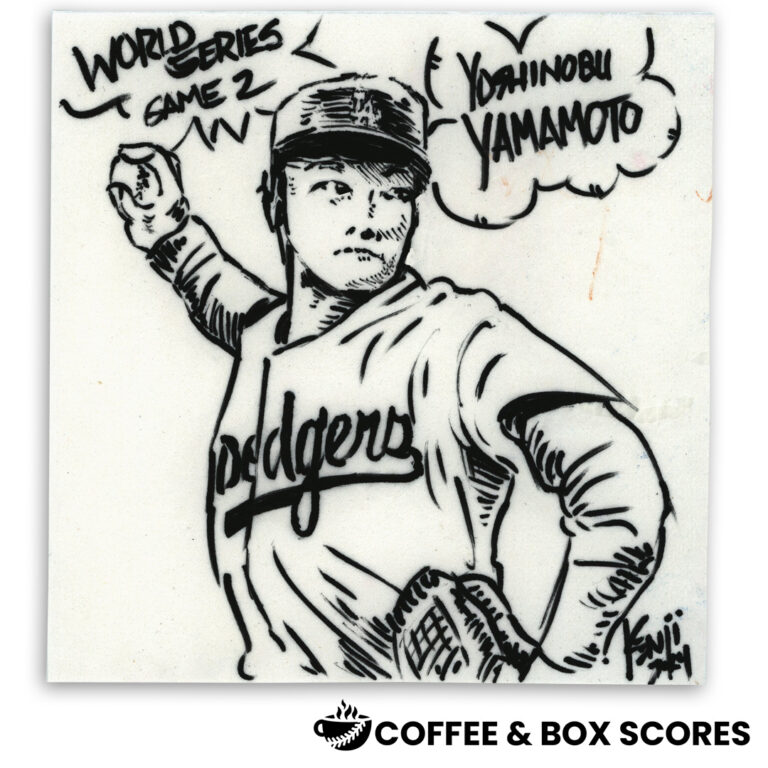The very last games of a season being played to determine a champ, a series of games played within a tight window on the calendar. By its very formula, the World Series is an alchemist of drama, a stoker of tension and breathlessness. Sometimes, though, it really transmutes the ingredients into the ultimate hero/goat dynamic, the stuff of dreams.
Think back to the 1980 Fall Classic, for example. The Phillies and Royals had split the first four contests. Naturally, when there were two outs in the ninth in Game 5, things could still go either way. The Phillies held a 4-3 lead but the Royals had the bases loaded. Tug McGraw faced José Cardenal. McGraw fanned Cardenal. Game over. Whew, take a breath.
The very next night, déjà vu all over again was in the air. Ninth inning, two outs, the Royals had the bases loaded again and were within distance of taking the lead, down 4-1. Willie Wilson faced McGraw. McGraw fanned Wilson. Game (and World Series) over. Double whew.
The Dodgers and Yankees have now faced each other on back-to-back nights and done a fair impersonation of those Games 5 and 6 from 44 years ago. Both contests this year seeing the final pitch thrown with the bases loaded, two outs and the trailing team having the chance to win or go ahead.
October baseball = gold.
Yoshinobu Yamamoto allowed a single run on a single hit in 6.1 innings to pick up the win in the Dodgers’ 4-2 victory over the Yankees. The series moves back to New York with LA up, two games to none.
~Yamamoto posted a Game Score of 69 for the effort. The score is the highest in the World Series for the Dodgers since Walker Buehler posted a 71 in a Game 3 win in 2020.
~Yamamoto’s 69 ranks 14th among the 68 entrants for a Dodgers starter against the Yankees. Don Drysdale’s Game 3 shutout in 1963 (a three-hitter with 9 K’s and a walk) produced the highest score, an 89.
~Yamamoto is one of 11 World Series starters ever to furnish a line with at least six innings and no more than one hit allowed. A few side-notes to this:
*Three of the 11 examples on this list have risen from the Dodgers-Yankees rivalry. New York’s Bill Bevens allowed just one hit in 8.2 innings in his loss in Game 4 in 1947; Yankee Don Larsen did not allow anything in his perfect game in 1956’s Game 5.
*One other Dodger – Rich Hill – makes an appearance. In Game 4 of the 2018 Fall Classic, the southpaw, like Yamamoto, allowed a hit and a run in six-and-a-third frames.
*The others to populate the list: Ed Reulbach^ (1906), Claude Passeau^ (1945), Jim Lonborg^ (1967), Tom Glavine (1995), Orlando Hernández and David Cone (1999), and Cristian Javier (2022).
^complete game efforts
Freddie Freeman, Teoscar Hernández, and Tommy Edman homered in the 4-2 win.
~Freeman is the first Dodger to go yard in both Games 1 and 2 of a World Series. Overall, he’s the first to do this since David Ortiz for the Red Sox in 2013, and one of just 11 players in history to do it. Two batters opened a Fall Classic with homers in Games 1, 2 and 3: Hank Bauer for the Yankees in 1958 and Barry Bonds for the Giants in 2002. Interestingly, it’s been 54 years since a player homered in both Games 1 and 2 while playing on the winning side in both affairs. In between Freeman and Boog Powell in 1970, five players homered in Games 1 and 2 but saw their team drop one of the first two contests.
~Freeman’s shot immediately followed Hernández’s, a two-run dinger to put the Dodgers up 3-1. With the event, Los Angeles had its first World Series back-to-back longballs since Pedro Guerrero and Steve Yeager took Ron Guidry deep in the bottom of the seventh of Game 5 in 1981. Back then, the Dodgers entered that frame down 1-0 in the contest and with the series tied at two games apiece. The Dodgers won that Game 5, 2-1.
~Edman’s second-inning homer highlighted a box score that also featured a double and a steal.
*Edman became the 39th player to have a homer and a steal in a Fall Classic contest. Other Dodgers to do it: Wes Parker in 1965, Joe Ferguson in 1974, Davey Lopes in 1977 and 1978 and Mookie Betts in 2020. Lopes is one of five players to populate the list multiple times, joining Lou Brock (thrice) and David Justice, Lenny Dykstra and Chase Utley (twice).
*If, like Tommy Edman, one throws another extra-base hit into the mix and stirs, the result is this:
2 XBH (incl. 1 HR) & SB in a World Series game
Sam Crawford 1909, G5
Lou Brock 1968, G4
Dan Driessen 1976, G3
Willie Randolph 1981, G6
Dan Gladden 1987, G1
Kirby Puckett 1991, G6
Lenny Dykstra 1993, G4
Chase Utley 2009, G5
Juan Soto 2019, G1
Tommy Edman 2024, G2
*Edman has struck for multiple hits in five straight postseason games and has seven multi-hit games in this year’s playoffs. The five-game streak stands tied for the second longest ever in a single postseason, trailing Yordan Alvarez’s mark produced just last year, when the Astro assembled a six-gamer. Edman owns the longest streak ever for a Dodger, having already pushed past a pack at three.
Edman needs two more multi-hit performances to match the mark for the most in a postseason, a mountaintop shared by Marty Barrett (1986), Marquis Grissom (1996) and Troy Glaus (2002). Edman already shares the address on the Dodgers’ peak, along with Steve Garvey (1981) and Mookie Betts (2020).
Juan Soto homered in the loss and now has four round-trippers on his career World Series card.
~Soto’s latest longball on the Word Series stage came just a day after the outfielder celebrated his 26th birthday. He’s one of seven to have as many as four World Series home runs at this age-stage of his career. Mickey Mantle had hit nine, Goose Goslin had six, and Alex Bregman owned five. Lou Gehrig, Jimmie Foxx and Gil McDougald also hit four.
~Soto is one of 89 players to own at least 40 career World Series plate appearances before turning 27 years old. If you take all 89 and organize them by highest to lowest OPS, Soto is just a rung away from the top, trailing only Lou Gehrig and his 1.354. Soto’s 1.228 is ahead of Bobby Brown’s 1.207, Home Run Baker’s 1.102 and Charlie Keller’s 1.094 (to round out the top five).
The Dodgers have won six straight World Series games against the Yankees. The streak dates back to the final four contests of the ’81 Fall Classic, after Los Angeles dropped the first two of that series and then stormed back to win the next four. This six-game streak matches the longest of its kind in the 68 World Series games played between the two clubs. The only other instance of one team taking six (or more) straight came immediately before this current six-game streak began. In the 1978 World Series, the Yankees won the final four games and then took the first two in 1981. Which leads to …
The Dodgers and Yankees are playing in their 12th World Series. 2024 marks the eighth time a club has won each of the first two games. Some details about these circumstances:
1947: Yankees win the first two at home & win the World Series in seven
1953: Yankees win the first two at home & win the World Series in six
1955: Yankees win the first two at home & lose the World Series in seven
1956: Dodgers win the first two at home & lose the World Series in seven
1963: Dodgers win the first two on the road & win the World Series in four
1978: Dodgers win the first two at home & lose the World Series in six
1981: Yankees win the first two at home & lose the World Series in six
2024: Dodgers win the first two at home and ???????
The Dodgers are out-homering the Yankees in this World Series, 4-2. All-time, the Yankees hold the edge, 68-60.
All-time, the Dodgers-Yankees series now stands with New York having won 37 of the 68 Fall Classic contests and holding a +30 run advantage.
Back to the open, with a little more explanation and connection. For the second straight contest in this 2024 World Series, the game’s final play came with the trailing team having the bases loaded and the chance to win or go ahead. Trying to find the last time back-to-back World Series games had this scenario in place as the final pitch was delivered … it looks like Games 5 and 6 of the 1980 Fall Classic.
Thanks to Baseball Reference and its extraordinary research database, Stathead, for help in assembling this piece.

Roger Schlueter
As Sr. Editorial Director for Major League Baseball Productions from 2004-2015, Roger served as a hub for hundreds of hours of films, series, documentaries and features: as researcher, fact-checker, script doctor, and developer of ideas. The years at MLB Production gave him the ideal platform to pursue what galvanized him the most – the idea that so much of what takes place on the field during the MLB regular and postseason (and is forever beautifully condensed into a box score) has connections to what has come before. Unearthing and celebrating these webs allows baseball to thrive, for the present can come alive and also reignite the past.


